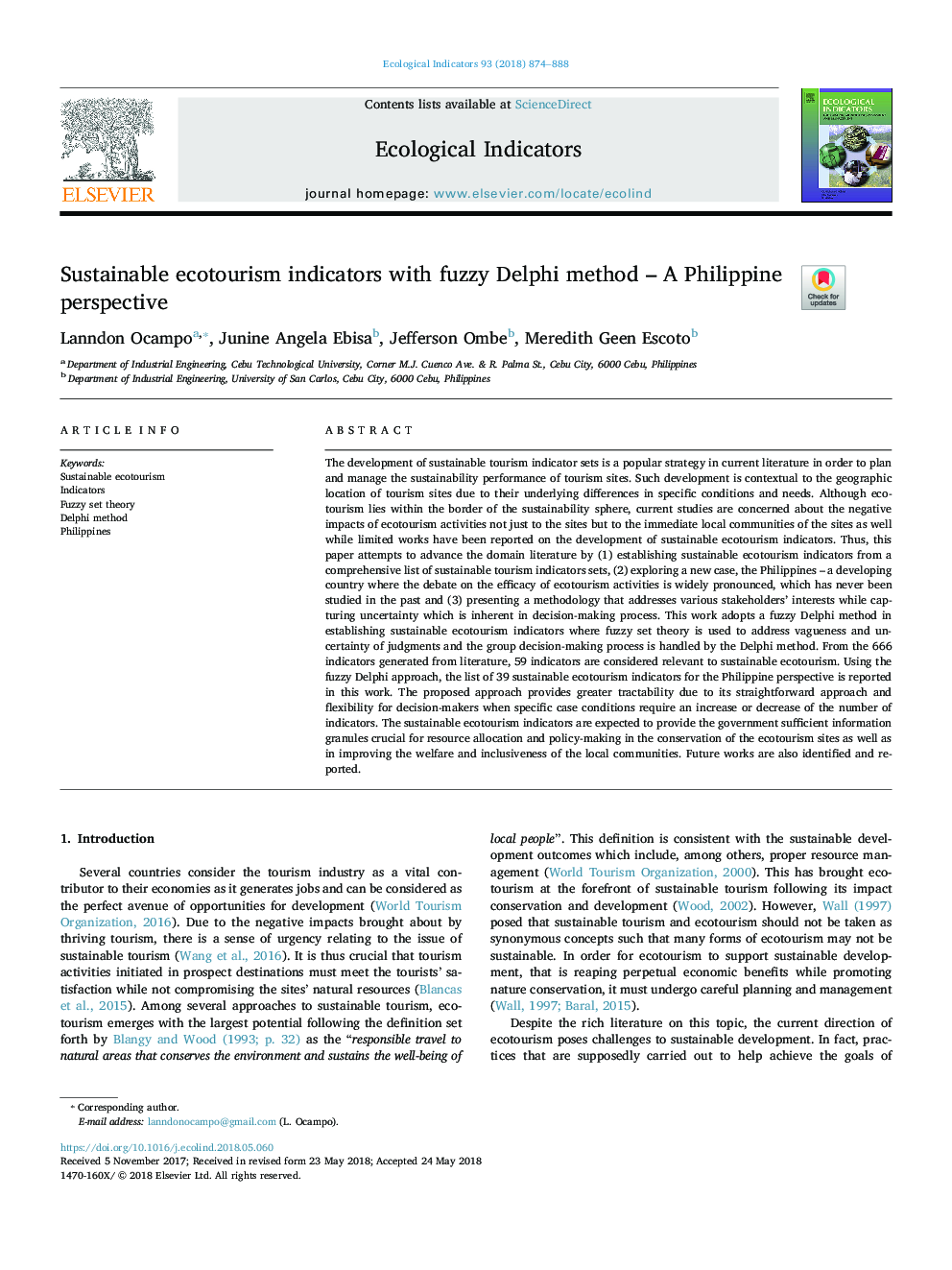| کد مقاله | کد نشریه | سال انتشار | مقاله انگلیسی | نسخه تمام متن |
|---|---|---|---|---|
| 8845238 | 1617109 | 2018 | 15 صفحه PDF | دانلود رایگان |
عنوان انگلیسی مقاله ISI
Sustainable ecotourism indicators with fuzzy Delphi method - A Philippine perspective
ترجمه فارسی عنوان
شاخص های اکوتوریسم پایدار با روش دلفی فازی - دیدگاه فیلیپین
دانلود مقاله + سفارش ترجمه
دانلود مقاله ISI انگلیسی
رایگان برای ایرانیان
کلمات کلیدی
اکوتوریسم پایدار، شاخص ها، تئوری مجموعه فازی روش دلفی، فیلیپین،
ترجمه چکیده
توسعه مجموعه شاخص های گردشگری پایدار استراتژی محبوب در ادبیات جاری برای طراحی و مدیریت عملکرد پایداری سایت های گردشگری است. چنین توسعه ای به دلیل موقعیت های جغرافیایی سایت های گردشگری به دلیل تفاوت های اساسی آنها در شرایط و نیازهای خاص، متضاد است. گرچه اکوتوریسم در مرز حوزه پایداری قرار دارد، مطالعات فعلی در مورد تأثیرات منفی فعالیت های اکوتوریسم نه تنها به سایت ها، بلکه به جوامع فوری محلی این سایت ها نیز مربوط می شود، در حالیکه محدودیت های کار در توسعه اکوتوریسم پایدار گزارش شده است شاخص ها. بنابراین، این مقاله تلاش می کند تا ادبیات دامنه را به وسیله (1) ایجاد شاخص های اکوتوریسم پایدار از فهرست جامعی از مجموعه های شاخص های گردشگری پایدار، (2) کشف یک مورد جدید، فیلیپین - یک کشور در حال توسعه که در آن بحث در مورد اثربخشی اکوتوریسم فعالیت ها به طور گسترده ای بیان شده است، که در گذشته مورد مطالعه قرار نگرفته است و (3) ارائه یک روش شناختی که منافع ذینفعان را مورد توجه قرار می دهد در حالی که عدم قطعیت را که در فرآیند تصمیم گیری ذاتی است، مورد توجه قرار می دهد. این کار یک روش دلفی فازی را در ایجاد شاخص های زیست محیطی پایدار اتخاذ می کند که در آن نظریه مجموعه فازی برای رفع ابهام و عدم قطعیت قضاوت استفاده می شود و فرایند تصمیم گیری گروهی با استفاده از روش دلفی انجام می شود. از 666 شاخص تولید شده از ادبیات، 59 شاخص در رابطه با اکوتوریسم پایدار در نظر گرفته شده است. با استفاده از رویکرد دلفی فازی، لیست 39 شاخص زیست محیطی پایدار برای چشم انداز فیلیپین در این کار گزارش شده است. رویکرد پیشنهادی با توجه به رویکرد ساده و انعطاف پذیری آن برای تصمیم گیرندگان امکان پذیر می شود، زمانی که شرایط خاص مورد نیاز افزایش یا کاهش تعداد شاخص ها باشد. انتظار میرود شاخص های پایدار اکوتوریسم، حاوی اطلاعاتی در خصوص تخصیص منابع و سیاست گذاری در حفاظت از سایت های اکوتوریسم و همچنین بهبود رفاه و مشارکت جوامع محلی باشد. آثار آینده نیز شناسایی و گزارش شده است.
موضوعات مرتبط
علوم زیستی و بیوفناوری
علوم کشاورزی و بیولوژیک
بوم شناسی، تکامل، رفتار و سامانه شناسی
چکیده انگلیسی
The development of sustainable tourism indicator sets is a popular strategy in current literature in order to plan and manage the sustainability performance of tourism sites. Such development is contextual to the geographic location of tourism sites due to their underlying differences in specific conditions and needs. Although ecotourism lies within the border of the sustainability sphere, current studies are concerned about the negative impacts of ecotourism activities not just to the sites but to the immediate local communities of the sites as well while limited works have been reported on the development of sustainable ecotourism indicators. Thus, this paper attempts to advance the domain literature by (1) establishing sustainable ecotourism indicators from a comprehensive list of sustainable tourism indicators sets, (2) exploring a new case, the Philippines - a developing country where the debate on the efficacy of ecotourism activities is widely pronounced, which has never been studied in the past and (3) presenting a methodology that addresses various stakeholders' interests while capturing uncertainty which is inherent in decision-making process. This work adopts a fuzzy Delphi method in establishing sustainable ecotourism indicators where fuzzy set theory is used to address vagueness and uncertainty of judgments and the group decision-making process is handled by the Delphi method. From the 666 indicators generated from literature, 59 indicators are considered relevant to sustainable ecotourism. Using the fuzzy Delphi approach, the list of 39 sustainable ecotourism indicators for the Philippine perspective is reported in this work. The proposed approach provides greater tractability due to its straightforward approach and flexibility for decision-makers when specific case conditions require an increase or decrease of the number of indicators. The sustainable ecotourism indicators are expected to provide the government sufficient information granules crucial for resource allocation and policy-making in the conservation of the ecotourism sites as well as in improving the welfare and inclusiveness of the local communities. Future works are also identified and reported.
ناشر
Database: Elsevier - ScienceDirect (ساینس دایرکت)
Journal: Ecological Indicators - Volume 93, October 2018, Pages 874-888
Journal: Ecological Indicators - Volume 93, October 2018, Pages 874-888
نویسندگان
Lanndon Ocampo, Junine Angela Ebisa, Jefferson Ombe, Meredith Geen Escoto,
